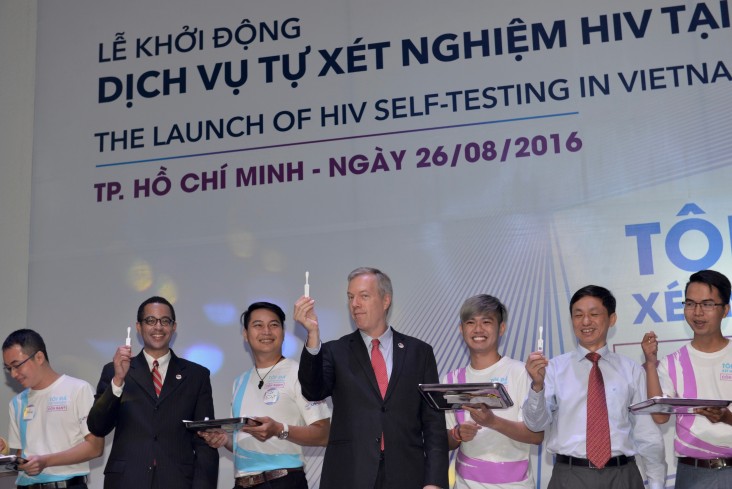
For Immediate Release
HIV self-testing is a new strategy to increase access to HIV services and accelerate achievement of the government of Vietnam’s ’90-90-90’ goals. [1]
HO CHI MINH CITY, August 26, 2016 – Leaders and senior officials from the Ministry of Health (MoH), the US Embassy, local authorities, HIV workers and community groups, and celebrities gathered today at an event to launch the first-ever HIV self-testing services in the country. The launch marks a new trend in Vietnam, where HIV-affected populations will have a new choice to test themselves for HIV in a private and confidential way, and therefore be the first to know their preliminary results.
HIV self-testing has the potential to significantly increase HIV testing uptake among at-risk populations, particularly those who are reluctant to get tested at health facilities. Fear of stigma and lack of confidentiality can pose barriers to HIV testing, but this may change with this new HIV testing option. “HIV self-testing is the next step in increasing access to HIV testing, and normalizing it as other over-the-counter rapid tests do (e.g., for diabetes or pregnancy). It can help Vietnam in achieving 90-90-90 by reaching the yet unreached individuals and enrolling those that have HIV into treatment services,” stated the Director of the Vietnam Administration for HIV/AIDS Control (VAAC), Dr. Nguyen Hoang Long.
Since October 2015, the Healthy Markets project, supported by the US President’s Emergency Plan for AIDS Relief (PEPFAR) through the US Agency for International Development (USAID) and implemented by PATH, has collaborated with the MoH to introduce community-based HIV testing options for key populations, including HIV self-testing. “Now, our Vietnamese and American partnership is launching HIV self-testing, which puts testing directly in the hands of the individual. HIV testing has never been as simple as it is with a self-test. Anyone at risk can learn their HIV status confidentially, privately, and in a safe way,” said US Ambassador Ted Osius.
Dr. Vu Ngoc Bao, Deputy Director for Healthy Markets at PATH says initial results from HIV self-testing have been very promising: “Since the end of May, over 377 individuals have opted for HIV self-testing. Of the seven percent confirmed HIV positive, all (100 percent) were successfully enrolled in HIV treatment services.”
Self-testing is being piloted in Ho Chi Minh City and Hanoi; the results will inform national guidelines and adoption in high HIV burden areas of the country. Community-based organizations play a key role in this effort, ensuring a sustainable HIV/AIDS response in Vietnam. Dr. Tieu Thi Thu Van, Director of the Ho Chi Minh City Provincial AIDS Center expressed: “HIV lay and self-testing have transformed the role of key population-led organizations in the city, and they’ve become our key partners in HIV prevention and testing services. We could not do this work without them.”
There is significant interest and excitement around HIV self-testing in key population communities in Vietnam. Thanh, Director of G-Link shares: “We are very excited to offer HIV self-testing to our community. There is so much interest in this approach and we think it will result in a significant increase in HIV testing among those that had previously been too scared to test.”
The government of Vietnam has committed to the United Nations 90-90-90 targets toward ending the HIV epidemic. Although Vietnam has seen a reduction in new HIV infections over recent years, there is low annual uptake of HIV testing among key populations at high risk of transmission. This includes people who inject drugs, men who have sex with men, transgender women, and female sex workers.
Through PEPFAR, the US government works closely with the MoH; Vietnam Social Security; the Global Fund to Fight AIDS, Tuberculosis and Malaria; and others, including PATH, to develop a sustainable HIV response that continues as Vietnam assumes more of the financial responsibility and implementation of its HIV programs and antiretroviral drugs.
The HIV self-testing launch was hosted by the MoH, VAAC, USAID, and PATH.
For photos of the event, visit: https://flic.kr/s/aHskH78Htd
[1] By 2020, 90% of all people living with HIV will know their HIV status; 90% of all people with diagnosed HIV infection will receive sustained antiretroviral therapy; 90% of all people receiving antiretroviral therapy will have viral suppression.







Comment
Make a general inquiry or suggest an improvement.